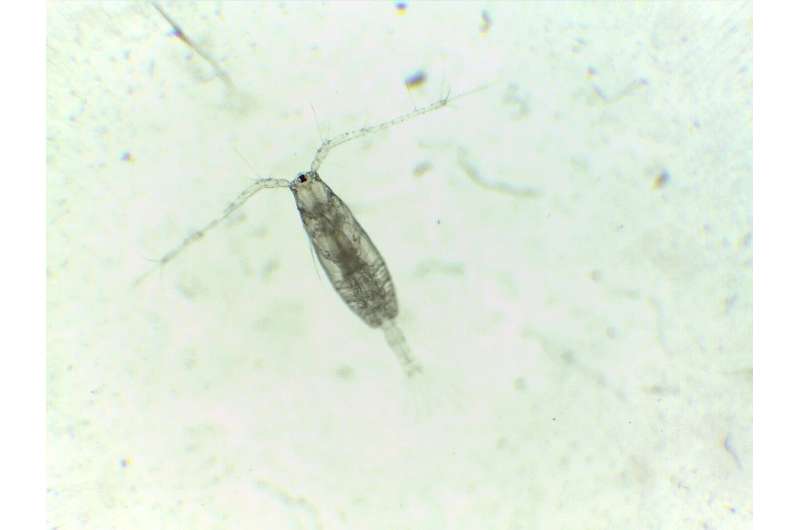This article has been reviewed according to Science X's editorial process and policies. Editors have highlighted the following attributes while ensuring the content's credibility:
fact-checked
peer-reviewed publication
trusted source
proofread
Underwater noise shown to disturb feeding behavior of marine organisms

Many marine organisms, such as fish, marine mammals and crustaceans, produce and use sound to navigate, reproduce, detect prey and avoid predators. However, anthropogenic sound, for example from the construction and operation of offshore wind farms, drilling, seismic surveys and shipping, is changing the acoustic landscape in the ocean.
Scientists at the Research and Technology Centre Büsum (FTZ) of Kiel University have now investigated for the first time in the laboratory how such unnatural sound sources affect copepods, small organisms at the bottom of the food chain. Their experiments showed that the tiny crustaceans are so sensitive to harbor noise caused by periodic shipping traffic that they significantly reduce their food intake. The results of the new study have recently been published in the journal Frontiers in Marine Science.
Copepods are crustaceans a few millimeters in size, found in almost all the world's waters. In the ocean, they form the base of the food web and are important prey for commercial fish species such as herring. They also influence the transfer of carbon in the ocean. Without crustaceans, an important link between primary production and higher trophic levels in the marine ecosystem would be missing.
FTZ researchers from the ECOLAB—Coastal Ecology working group have now investigated for the first time how resistant these animals are to external environmental factors. For their experiments, they studied the feeding rates of the copepod Acartia tonsa in an aquarium under normal ambient noise and under noise from shipping. Shipping is considered a major source of continuous underwater noise and can increase noise levels to more than 30 decibels above natural ambient noise.
A total of 51 sets of experiments were evaluated. These included 688 copepods exposed to either ship noise (343) or aquarium ambient noise (345).
Underwater noise stresses copepods during feeding behavior
"Underwater noise is clearly a stressor for some crustacean species. We found that the food intake of copepods was significantly reduced compared to the aquarium ambient sound treatment," says Saskia Kühn, who works in the ECOLAB coastal ecology group at the FTZ and conducted the experiments. The negative effects have been studied and proven in the laboratory.
"Now we need to repeat the experiments in field studies to investigate the effect of noise on the feeding behavior of copepods under realistic sound conditions. This is important to assess the potential impact of underwater noise on ecosystems in the future," says Kühn.
To date, there are few scientific studies that explicitly address the effects of noise on the feeding ecology of zooplankton. The new FTZ study provides a starting point for future research projects.
"Noise-related effects also have the potential to alter the composition of the community. We need to know the exact effects of such stressors in the ecosystem in order to be able to adapt strategies accordingly and contribute to a good and healthy state of the marine environment," says PD Dr. Katja Heubel, head of the Coastal Ecology working group at the FTZ and member of the Kiel Marine Science (KMS) priority research area at Kiel University.
More information: Saskia Kühn et al, Decreased feeding rates of the copepod Acartia tonsa when exposed to playback harbor traffic noise, Frontiers in Marine Science (2023). DOI: 10.3389/fmars.2023.1134792
Journal information: Frontiers in Marine Science
Provided by Kiel University
















